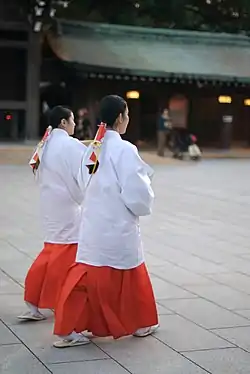巫女
Chinese
| witch; Malay | female; woman; daughter | ||
|---|---|---|---|
| trad. (巫女) | 巫 | 女 | |
| simp. #(巫女) | 巫 | 女 | |
| anagram | 女巫 | ||
Pronunciation
Japanese

巫女 (miko): a pair of miko or shrine maidens at Meiji Jingu.
Etymology 1
| Kanji in this term | |
|---|---|
| 巫 | 女 |
| Jinmeiyō | Grade: 1 |
| irregular | |
| Alternative spellings |
|---|
| 神子 神巫 覡 巫 |
From Old Japanese. Originally a compound of 神 (mi, “spirit, god”) + 子 (ko, “child”), as suggested by the alternative spelling 神子.
Formerly spelled as 巫 on its own.[1] The modern kanji spelling 巫女 appears to be jukujikun (熟字訓).
Pronunciation
Noun
巫女 • (miko)
- An unmarried woman who serves at a Shintō shrine, helping to receive visitors and performing 神楽 (kagura) dances at ceremonies, among other responsibilities. A shrine maid.
- An unmarried woman who serves a deity as a medium to convey oracles.
- 2017 April 15, “星杯を戴く巫女 [Priestess Who Drinks from the Star Chalice]”, in Code of the Duelist, Konami:
- 星神に鎮魂の祈りを捧げる巫女。
- Seishin ni chinkon no inori o sasageru miko.
- A priestess who offers soul-reposing prayers to the Star God.
- 星神に鎮魂の祈りを捧げる巫女。
-
Usage notes
Using the alternate spelling 神子, a miko could be of either gender, but unmarried young women are by far the most common.
Synonyms
Derived terms
Etymology 2
| Kanji in this term | |
|---|---|
| 巫 | 女 |
| ふ Jinmeiyō |
じょ Grade: 1 |
| on’yomi | |
From Middle Chinese compound 巫女 (mju? nrjoX, literally “shaman + woman”). Compare modern Mandarin reading wūnǚ.
This article is issued from Wiktionary. The text is licensed under Creative Commons - Attribution - Sharealike. Additional terms may apply for the media files.